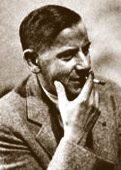Alfred Richard Orage

Alfred Richard Orage (1873-1934) was a British intellectual, who was the editor of the magazine The New Age. Born on 22 January 1873 in Dacre, Yorkshire, England, into a nonconformist religious family, he worked as a schoolteacher and wrote for a newspaper of the Independent Labour Party on such topics as philosophy of Plato and Edward Carpenter. Abandoning his socialist political leanings, Orage developed an interest in religion and mysticism, discovering theosophy, the Bhagavad-Gita and Nietzsche. Together with British journalist and writer, Holbrook Jackson he founded the Leeds Arts Club, a leading center for modernist aesthetics of that period, promoting works by George Bernard Shaw, Henrik Ibsen and Nietzsche.
Orage was hailed by T.S. Eliot as the best literary critic of his time. Orage analyzed Nietzsche’s idea of the Superman as a metaphor for the higher state of consciousness aspired to by mystics. Subsequently Orage moved to London, where with the support of George Bernard Shaw he bought the weekly magazine The New Age in partnership with Holbrook Jackson, turning into his distinct platform in the sphere of politics, literature and the arts. Its contributors included T.E. Hulme, Wyndham Lewis, Ezra Pound and Herbert Read. In 1914 Orage met with P.D. Ouspensky, by whose mystical ideas he became impressed. After that time Orage focused his attention primarily on mysticism, becoming less interested in literature and art.
When Ouspensky moved to London, Orage attended his lectures on ‘fragmentary’ teaching. In February 1922 Ouspensky introduced Orage to Gurdjieff, after which Orage sold the New Age and moved to Paris to study at the Institute for the Harmonious development of Man. Orage wrote a number of books prior to his meeting with Gurdjieff as well as those written following the meeting, the latter being influenced by Gurdjieff’s teaching or developing it further. He also wrote a number of books about Hinduism and Buddhism, as well as a book of aphorisms. He helped render Gurdjieff’s book Beelzebub’s Tales to his Grandson into articulate English and also wrote commentaries to the book. In 1924 Gurdjieff appointed Orage to lead study groups in America, and in May 1924 Orage came to New York to help supervise Gurdjieff’s work there. This was especially necessitated by Gurdjieff’s car accident. Orage is the only historically verifiable figure who was mentioned in Gurdjieff’s writings in considerable quantity.
After a few years Gurdjieff deposed Orage from this position and disbanded his groups, believing them to be taught incorrectly, challenging Orage’s performance, motives and preoccupation with self-observation. Members were allowed to continue studies with Gurdjieff after promising not to communicate with Orage. In May 1930 Orage returned to England, renewing his interest in socialist political issues. In April 1932 he founded a new journal, The New English Weekly. Orage suffered severe health problems in his later years which hampered his activities. He was about to introduce Gurdjieff’s ideas into his newspaper and elsewhere when he unexpectedly died on 6 November, 1934. Gurdjieff refered to Orage’s decease as “the death of my close friend, Mr. Orage” and claimed that his death prompted him to begin his final book “Life is Real only when I am”. A number of people, who participated in Orage’s group in New York wrote about their experiences with him, most notably Louise Welch, who wrote a book of memoirs, Orage with Gurdjieff in America in 1982.
more about A. R. Orage:
on the web-site Katherine Mansfield
Articles:
- Essentials Aphorisms and Observations
- On Love
- On Dying Daily
- On Religion
- Economising Our Energy
- Are We Awake?
- Talks with Katherine Mansfield at Fontainebleau
- Nietzsche: The Dionysian Spirit of the Age
- My Note Book – October 1933*
- My Note Book – April 1934*
- My Note Book – January 1934*
- Discussion on “Good and Evil” with A. R. Orage*
- A Theatre for Us*
- Conscious or Objective Morality*
- A.R. Orage – Gurdjieff Meeting Notes*
- Notes taken by Blanche B. Grant on A.R.Orage’s group talks (Beginners Group 1929-1930)*
- Morris, Lawrence S. – Note Books of L. S. M.: Orage Lectures [1927-1928] Unpublished typescript*
- Manchester, Sherman – Sherm’s Orage Notes: 1923 -1929 typescript carbon copy*
in Russian:





